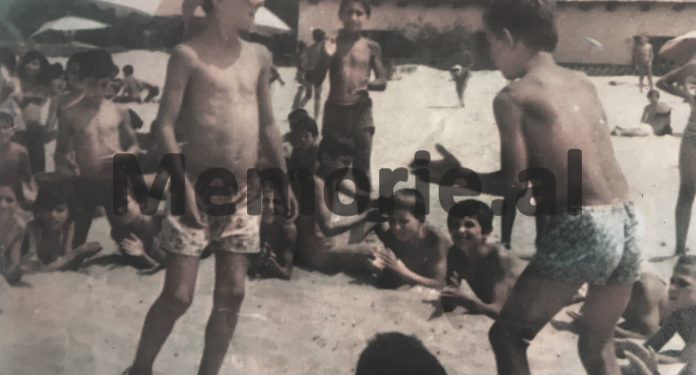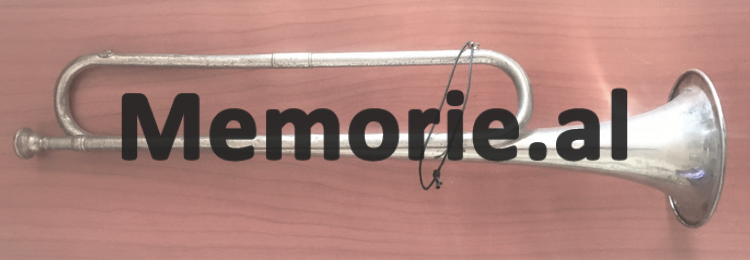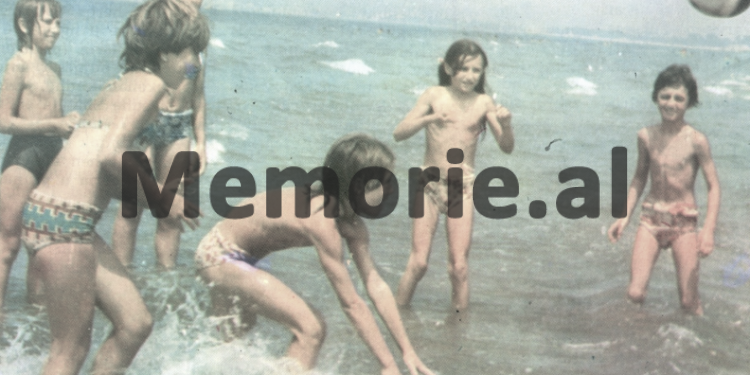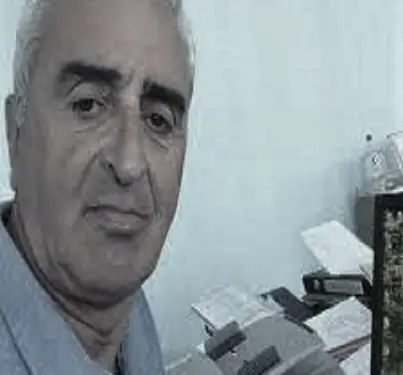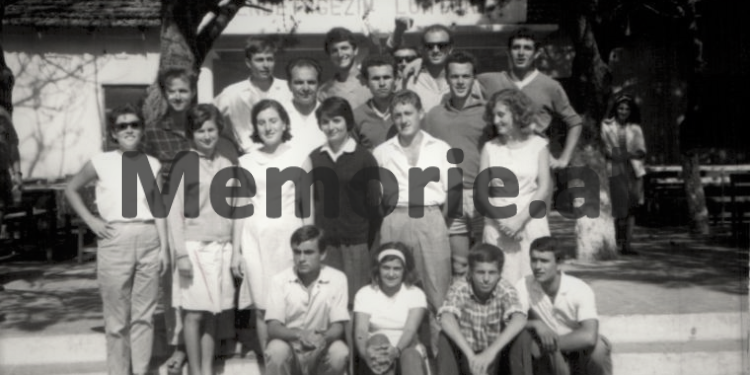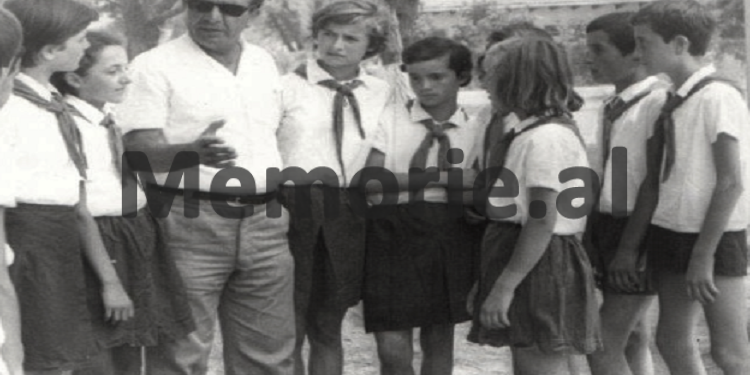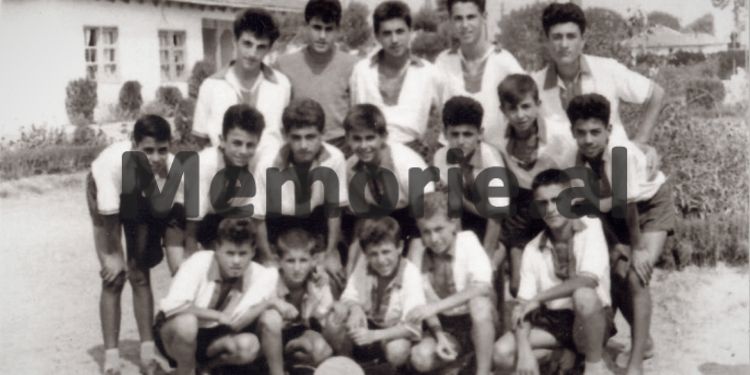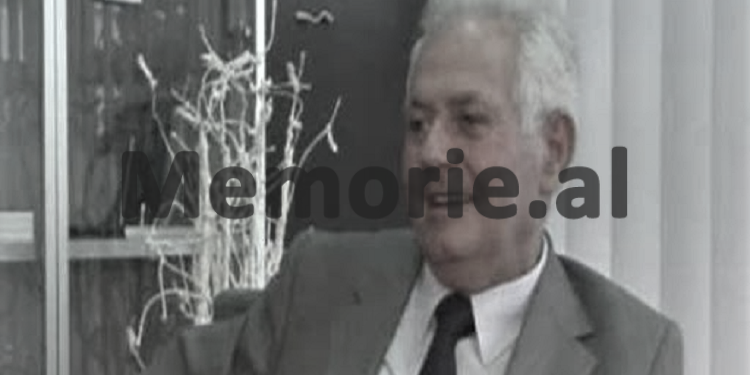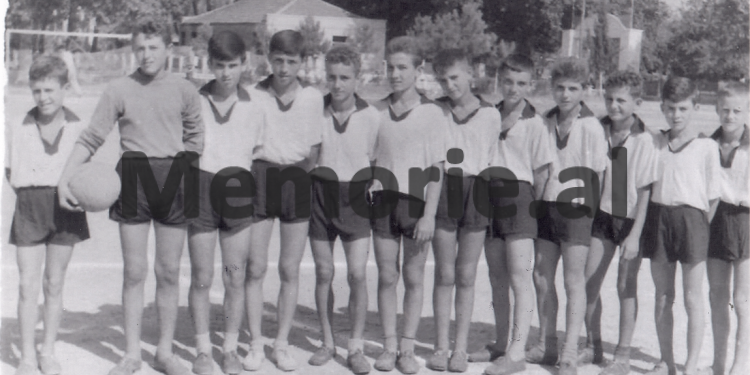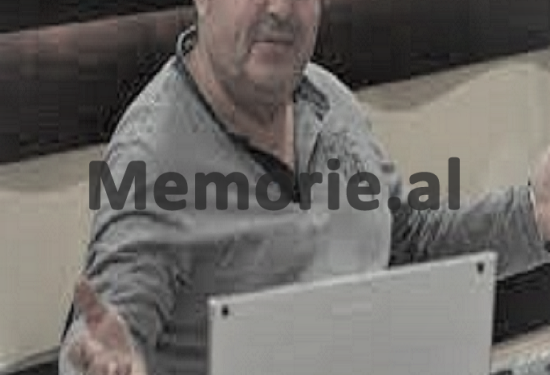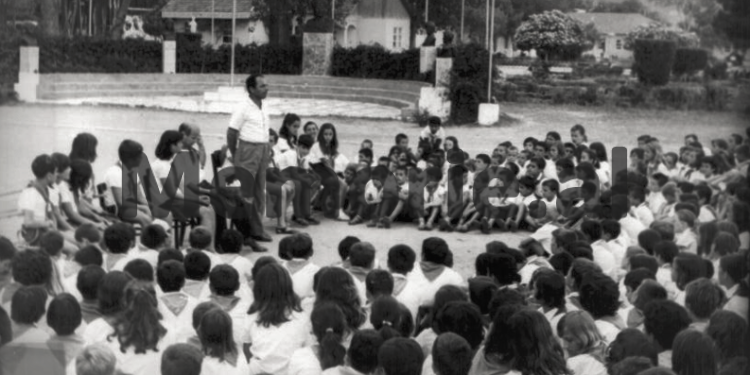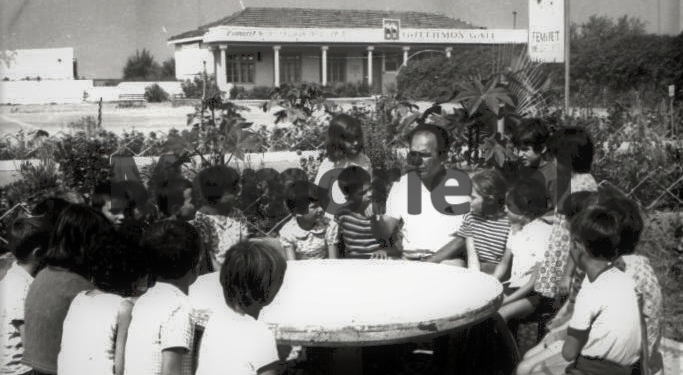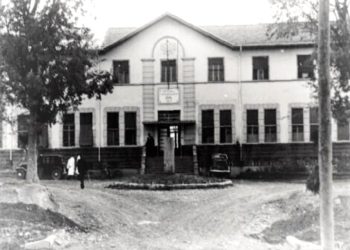From Uvil Zajmi
Memorie.al / Every time the summer, the beach period comes, it brings to the distant memory, the way, the forms that every family, every Albanian from small to adult, organized to rest, spending a few days near the sea. With them also the pioneer camps, so loved by that age, certainly preserved in everyone’s memory in the years to come. “I have also been to the pioneer camp…”, since there is no pioneer who has not spent, rested at least once in a summer or winter camp.
Together with the camp sheet, the instructors, the leaders, the raising of the flag and even the bugler with the burina and its sound “Ta….ta….ta….ta……..”, are unforgettable. Even more so today, that return is provoked every time you pass by former camps, former buildings, today transformed, changed, with little or no traces left from that time. Just what you can see in the pictures of the time that might help a little. For me, returning to that camp was a bit of a coincidence, when I was interested in something in one of the antique shops in Tirana, and a source caught my eye.
A normal source, not typical of orchestras, brass bands, but a well-known source that still preserves its sound today. An unforgettable sound associated with the camp, when from morning to night, everything was associated with it. She was the first and the last, with her signal you would start and end the daily activity. It was undivided, without the camp, staying in it made no sense. The source caught my attention, I took it in my hand, I looked at it with attention, curiosity. The seller, a friend of mine, knowing my passion for such items, tells me: “It’s the source that fell in the champion of pioneers in Durrës” – showing me a “Fatosi” magazine of the time, where you can clearly see, the boy bugler with burin. He kept both together, to confirm each other.
I left excited, but I didn’t leave that source, together with the magazine, there, I have it at home. A beautiful memory, although it’s very modest monetary value was nothing compared to its historical value. This was also an argument that prompted me to write this memoir-narrative, for that camp, for those generations. How does Kujtim Plaku, the little bugler, remember it today, when its sound woke up the pioneers every day, then the raising of the flag, until when with its signal they went to sleep. “trumpet was a symbol of the camp,” says the well-known Durrsak musician.
We once had the “Qemal Stafa” Pioneer Camp in Durrës
With the name of the national hero, designed and located in Plepat, as that area after Illyria is known, there was the Camp of Pioneers, “Qemal Stafa”. In that area known for the former villas of the Block, the Convalescence of the Ministry of the Interior, and that of the Defense, in the space between them for many years there was also the summer camp known for pioneers, the largest in the whole country. With several one-story buildings, close to each other, sports fields, greenery, a central square where the pioneers gathered every morning accompanied by the ritual of raising the flag, together with the canteen, the silos where the pioneers slept with bunk beds.
In every trip, up to 1000 pioneers from all over Albania spent their holidays there. Everything organized with instructors-teachers for each group, company, with daily sportive-cultural programs, where everyone participated. With the health center, the medical staff is always on standby. The departure and return of the pioneers from their cities was organized by bus. Such camps, but smaller, were almost all along the coast, such as on the beaches of Shengjin, Vlorë, and the lakeside ones, Shirokë, Pogradec. At the same time, the mountain camps, such as in Dajt, Voskopoja, etc., also operated. Of course, the most popular for the pioneers were those by the sea, in particular “Qemal Stafa” in Durrës.
They worked in the summer period, or rather in the three hot months, June, July, until the middle of August, to be closed on the eve of the beginning of the school season that started on September 1. Going there was provided with camp-sheets that family members for their children received from the work center between the Professional Unions, which they distributed to pioneers, distinguished students throughout Albania. It cost 800 All, while for the children of miners and oil workers, it was free. However, that camp was also frequented by foreign pioneers.
Mainly during the time of friendship with democratic countries, about 100 pioneers from Russia, Germany, Poland, Bulgaria, etc. came to spend their vacations in the “Qemal Stafa” Pioneer Camp. Even in 1964, a group of Belgian pioneers will be in this camp as visitors, something rare for the time. During their stay, they got to know the various activities of the Albanian pioneers, and participated in the raising of the flag every morning. A life in the community, unlearned, away from home, for that age was not easy.
The famous sports Spartakiads of the pioneers
They were famous for the time, the years, and the period. There is no pioneer who has not played there, representing his city. The “Qemal Stafa” Camp of Pioneers is also known for this fact, since the famous Sports Spartakiads for pioneers were held only there. Every year, over 600 pioneers-athletes took part there, a massive, extraordinary, highly frequented, beloved activity and where talents were discovered, who later wrote the history of national sports.
In the space of two weeks in the football field to the east of the camp, surrounded by several stairs for spectators, every morning, noon, it would be animated by the rivalry, the goals, the enthusiasm that accompanied the football, basketball, volleyball meetings. It has been and still remains today, an unforgettable tour specific to all. Winning the Spartakiad of Pioneers was a big event for the city. Especially football. The activity was programmed in the second fortnight of August, when the vacationing pioneers had left, to make way for the pioneering sportsmen.
That event, which took place in the “Qemal Stafa” Pioneer Camp, was more than a celebration, not for the competitors, the participants, but for the whole country. The opening and closing ceremonies were attended by senior leaders of the state, while the sports press paid attention with its information to that major activity. In one corner was the table with the sports results of the Spartakiad.
Kujtim Turku: “That little Burizan, that’s how they still remember me today”
Singer, composer, musician, not only in Durrës where he lives, but known everywhere, for the songs he composed mainly for children, as well as participating in many festivals in different cities, including the traditional one in Shkodër. After so many years, Kujtim Turku returns with a lot of nostalgia, memories, details, to life in the “Qemal Stafa” Pioneer Camp. He was one of the well-known bugler, when he became the most loved pioneer for the campers with his trumpet: “The trumpet was a symbol of order, discipline, very dear to pioneers and instructors, when they heard “Ta, ta ta, ta in hers” – says Turku.
Remember, you were a gifted child?
Although small, the late 70s were, I stood out as a resourceful pioneer. I sang beautifully, I was known in the artistic circles of Durrës. There was a moment when a pioneer was wanted who should sound the horn at the Pioneer Camp in Plepa. “Let’s try the Memory”, said someone in the circle, the music branch in the Palace of Pioneers in Durrës.
You may have been small, 8-9 years old, a pioneer; you still didn’t know the musical instruments?
It is said that trumpet should have been a pioneer. It is true that at that age no one was educated about tools. So it just needed a drop. Other children had tried it, I tried it too. The spring was simple, without pistons.
Did you struggle at the beginning?
They were calling melodies, which would serve as an echo. You had to have an ear and intuition to listen to what was required. They saw that keeping my lips, putting on the trumpet was good, as if I had studied so it seemed to them, they took me. “Ta.. ta…. Ta… ta….”, ta, I remember when I fell for it, it was the first time I tried it. There was a different tune for each event. From waking up in the morning, raising the flag, going to the canteen, going out on the sand, staying there, everything with a spring. On the beach for entering and exiting the water, there was a different call and every ritual had its sound and its sound which was a symbol for everyone, of education with order and discipline
What do you remember most from that time at camp?
I slept in a room, a dormitory, on bunk beds. I woke up early, put on the pioneer’s scarf, had my place, in the Flag Square, and with the horn I held aloft, I gave the signal “ta…ta…ta…ta…”, a strong, beautiful, ringing sound with which in few days the pioneers were taught. The important moment was when the flag was raised. During the day I was the last one to sleep, after I had given the command: “Pioneers all asleep”.
Did they get “angry” when you pulled them out of the water with your anger?
It was a pleasure to call the pioneers. Everyone had more fun than me, they were freer, I not so much. Just a pioneer tour. Then other trumpet came, with whom we were replaced. But the desire was great, I did for several years, then I grew up, when the age comes when you are no longer a pioneer.
Dr. Flamur Topi: “You served the pioneers, the most beautiful years of my life”
A very well-known and popular doctor, Flamur Topi, a multidimensional character, does not hide the nostalgia he has for that camp, for 15 years when he served with care the pioneers, who came there from all over Albania. “I ran the Health Center, and we could be on call day and night. We have never had serious cases”.
Dr. The flag you remember from the Pioneer Camp “Qemal Stafa”, in Durrës
The central or national camp, “Qemal Stafa” as it is also called that of the pioneers in Plepa, you first entered a road covered with greenery, after which you were in a large square wooded with willows. When you entered it seemed to be calm, then several buildings appeared in front of you, and finally you were in the center of the camp, in the square where the flag with the bust of “Qemal Stafa” was raised. On the facade of the entrance there were exhibitions, with distinguished pioneers, a wall newspaper with poems, writings and a large sign with large letters: “We rest and have fun”
Dr. Flaguri, how did the season start in the camp?
From the first days, cultural and sports circles were established, so that the pioneers were as active as possible. There were circles, singing, boating, inside it was also a club, and the camp club was called equipped with fun games. The camp was fenced, and no one could enter without permission. The pioneers were accompanied by family members, who had the right to come to the camp to see them. A child was not allowed to go to the same camp twice. But there were those who, within one season, secured camp sheets, going to two tournaments, to two different camps. When they were discovered, they were removed from the camp.
Raising the flag, an exciting moment for the pioneers?
I remember them even today, pioneers, pioneers with scarves, trump, lined up in squares, and the flag raised by a pioneer. It was very special for them. Their weeks in the camp were organized in such a way that nothing was missed, from waking up to the moment of the signal for sleep. The daily schedule was such that the pioneer camper spent the hours resting, studying, and having fun. Over 1,000 pioneers from all over Albania, students of primary, seven- and eight-year-old schools were there. From the morning, raising the flag, then to the beach, lunch, forced rest, in the afternoon “heart” and fun until the evening, when after dinner it was off to the dormitory. This was the daily ritual.
The funnest hour, definitely getting the pioneers into the water?
10.30 was beach time, in the area in front of the camp. With the buoy giving the signal, under the care of the instructors, divided into companies, it was a great amusement to them as soon as they came into contact with the sea. The noise was loud when the horn was heard and everyone ran towards the water. And this went on for about two hours. At noon there were no beach sessions, on rare occasions.
All in sync, with pack leaders, child ministry instructors?
There were leaders who had a group of 30 pioneers from all over Albania. As well as instructors of various specialties, swimming, hand games, scout, voice center, etc. They were from different cities, teachers, about 1600 together with the pioneers in one shift. There were gang leaders with 20 people running 20 companies. They could last one more shift. They were the first to inform us, in case of health, of the problems the pioneers had, as they were very connected and stayed by their side at all times.
You told me about an unforgettable director?
You are talking about the director Pëllumb Gjebrea, the well-known leader, as strict as he is with children. Endless years leading that camp, raising and passing on endless generations of pioneers. A correct, committed person, as a parent, educator, and exceptional organizer. It was not easy believe me. The last to sleep, the first to wake up. He controlled the children, careful in their treatment. On the front of the Camp, director Pëllumbi wrote: “Pioneer Rest Camp”, so everything was only for them, the children, not for leaders and instructors. That was the message of that banner.
Do you remember when the camp period started?
July 4, first round. Initially four shifts worked, and 16 days a shift, then the stay period was reduced to three shifts from 21-day stay. Surrounded, where no one could enter without permission. There is a curiosity, related to director Pëllumbi that it was there that he met his wife, in 1955, when she was a leader, he was the leader.
How was all that massive activity organized and administered?
There were leaders who had a group of 30 pioneers from all over Albania. They were from different cities, teachers, about 1600 pioneer-leaders in total took a shift. There were gang leaders with 20 people running 20 companies. These people could only dream one more shift. There were children, pioneers who did not know the sea, they were afraid, they cried, great care was needed with them. They were, they came from remote and deep mountainous areas.
Great work, responsibility, fairness too?
Director Gjebrea had the structure in his head; he went only a few days before the pioneers arrived. The camp also had the general director for administrative affairs, Manushaqe Boja from Durrësi. Everyone worked selflessly, from instructors, leaders, without forgetting Viktor Skanjeti, the tireless storekeeper, cook Xhepi, Aliu, Sadiku, waitress Feruzja, Sadiku, the laundry manager, Fiqon. Leta and Mamica at the voice center and the annual Sula, from Elbasan, music instructor are some that I can remember. The camp also functioned in the winter, for the Professional Unions, who used it for workers, etc
In closing, Dr. Flamuri, what will we say to the readers of “Panorama” about that unforgettable camp?
More than 16 – years of work, together with the unforgettable director Pëllumb Gjebrea, I believe he has done that. I have many memories from that camp, those years, and I even wrote a book, “Summer Day”, which was later turned into a film. Everything dedicated to that camp. We have not had any problematic cases with the pioneers in those years; this is also to be noted. Memorie.al




